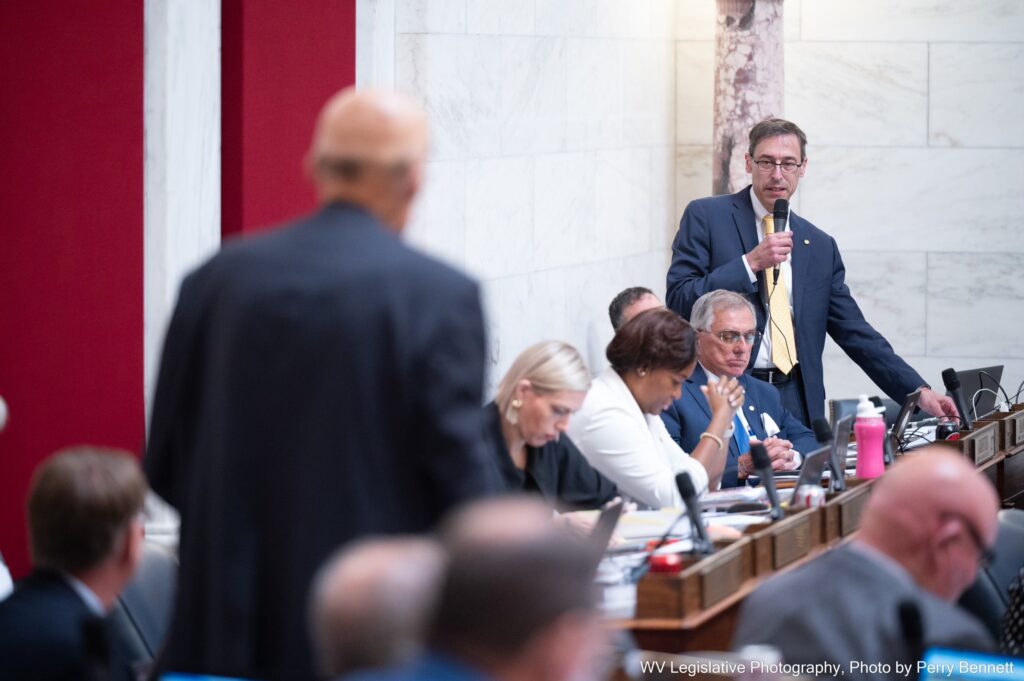West Virginia Republicans, Democrats Clash Over 2024 Legitimacy – Already

A proposal from five West Virginia Republicans urging the state not to recognize an “illegitimate presidential election” died quickly after it was introduced during a special legislative session.
But not before a group of Democrats countered with their own proposal, requesting that the Legislature affirm a “free and fair” election.
The session ended this week with no action on either resolution. But for some West Virginians, the brief episode reflects how the rural state’s Legislature, once majority-Democrat in a solidly blue state, has shifted further right over the past decade, especially since the rise of former President Donald Trump.
Delegate Evan Hansen (D), who was elected to the House of Delegates in 2018 and is running this year to keep his seat, and who sponsored the counter-proposal, said things have changed in the Legislature in the six years he’s been in office. There used to be “more of an opportunity to work in a bipartisan manner,” he said.
“But especially in the last two years, it’s been a very different environment, [a] very partisan, poisonous environment.”
The GOP-backed proposal, House Resolution 203, outlined the conditions in which an election would be deemed illegitimate, such as if the attorney general or secretary of state “determine that election fraud in any state was a major reason that resulted in a candidate for President obtaining a majority in the Electoral College.”
Democracy Docket reached out to the attorney general, secretary of state and governor’s offices for comment on the resolution. The statewide offices and the Legislature are controlled by Republicans.
Anne Lofaso, a professor at the West Virginia University College of Law, said she was shocked by the resolution “It was beyond my imagination.” Several sections were potentially unconstitutional, Lofaso said, such as the Legislature refusing to recognize the results in West Virginia because of suspected fraud in another state.
“Whether there’s election fraud in any state is determined by the courts,” she said, “not by the state legislature of a different state or even the state legislature of [West Virginia]. And therefore there’s a separation of powers problem.”
The proposal prompted a group of Democratic delegates to introduce a resolution, House Resolution 204, requesting that the Legislature “facilitate and promote respect for our democracy and government institutions and encourage acceptance of the results of our free and fair elections regardless of who prevails.”
A concurrent resolution is a legislative proposal that can “affect the actions, procedures or sentiments of both houses,” according to the Legislature. “Concurrent” means the measure must be adopted by both bodies. Both resolutions were referred to the House judiciary committee.
Democratic Delegate Mike Pushkin, one of the sponsors of 204, described the resolutions as more symbolic, and said he doesn’t think either would have had a material effect on the results. “Although it does have an effect,” he said, “because elected officials should be held to a higher standard, and they should know better.”
The GOP resolution said “West Virginia will not recognize any election of the Democrat candidate for President during the 2024 election cycle if the Republican presidential or vice-presidential candidate is assassinated, seriously injured during an assassination attempt, incarcerated, de facto eliminated or barred from the ballot in any states.”
“It’s not just unconstitutional,” Pushkin said, “but it’s un-American for them to draft that resolution and introduce it in a state Capitol. It’s ridiculous. I think it’s a form of election interference. They’re casting doubt on the outcome of an election in which the first vote hasn’t even been cast yet.”
It also asserted that “there is abundant evidence that non-citizens have been and are being registered to vote in the national election of 2024,” without indicating what the evidence is. The issue of noncitizen voting has been a common refrain from Republicans across the country over the past year.
Four of the five Republican delegates who introduced Sunday’s proposal also brought forth another resolution in January that sought to declare Trump a “non-resident citizen of the State of West Virginia” in an attempt to have his federal criminal trial be moved to the state or out of D.C, which the proposal calls a “political enclave that is the seat of the federal bureaucracy.”
That resolution didn’t appear to make it out of the judiciary committee, nor did a resolution calling on Congress to disband the Federal Bureau of Investigation and “other politicized intelligence and law enforcement agencies.”
“There are often a lot of bills and resolutions that are kind of out there,” Hansen said. “But [that] doesn’t mean it won’t move. You still have to take it all seriously.”